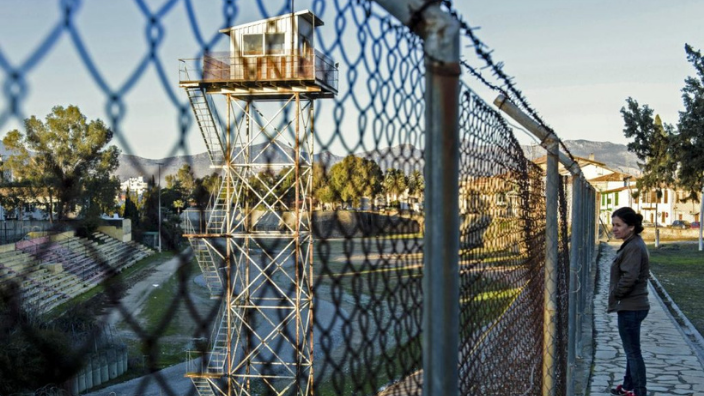By Dr Dimitri Gonis*
The satirist George Mikes once quipped that, having realised it could never be a world power, Cyprus decided to become a world nuisance.
It’s a ‘comedy’ which owes its longevity to blatant international hypocrisy and indifference more broadly. Something reaffirmed today in Ukraine.
Cyprus was first handed over to Britain by the Ottomans in 1878 as insurance against Russian aggression, becoming a Crown colony in 1925.
For Greek-Cypriots, which make up 80 percent of the island’s inhabitants, the arrival of the British was at first seen as a blessing. They mistakenly believed that British philhellenism, which had been instrumental to the liberation of Greece, would also support Greek-Cypriot dreams of union with the latter.
READ MORE: Bones of Charalambos Kokotsis’ missing brother found years after the Turkish invasion of Cyprus.
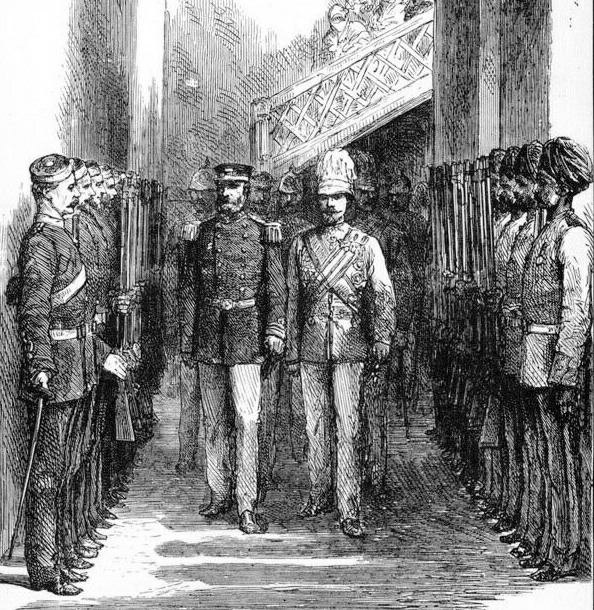
Greek-Cypriots soon discovered that things had, surprisingly, been much better under the Ottomans.
By the early fifties, the Greek-Cypriot struggle for union with Greece had become a major challenge for British interests on the island. Protests increasingly assumed the form of urban and guerrilla warfare between Greek-Cypriots and the British.
Realising that they didn’t need to actually possess the entire island in order to control it, the British encouraged Turkish-Cypriots to also assert their own national aspirations. At the same time, they began to float the idea of an independent republic within the Commonwealth.
The new Republic would have a Greek-Cypriot president and a Turkish-Cypriot Vice President. Britain would retain 99 square kilometres of the island and, along with Greece and Turkey, become a guarantor of the new constitution. The new constitution was signed on 16 August 1960 and the modern Republic of Cyprus was born.
Britain had skillfully handballed the Cyprus Problem to the Greek and Turkish-Cypriots, as well as Greece and Turkey, whilst securing its strategic interests in the region. It had also managed to frame the conflict as one of ancient ethnic rivalries whilst preserving its ‘mediatory’ role.
READ MORE: Personal stories of survival and loss during the Turkish invasion of Cyprus.
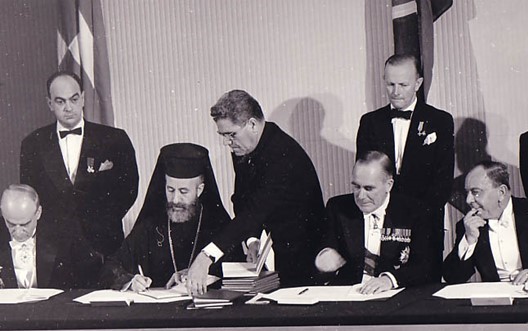
The main beneficiary of Cyprus’ first constitution was the 18% Turkish-Cypriot community with a 30% representation in government and 40% in the armed forces. From a Greek-Cypriot point of view, this distribution of power was disproportionate and therefore, unfair.
The issue was brought to a head in 1963 when Greek-Cypriot President Makarios suggested amendments that were supposed to address the constitutional imbalance. The result was the outbreak of violence, pushing Turkish-Cypriots into enclaves. This was followed by the establishment of a buffer zone.
After 1967, Greek-Cypriot nationalism became increasingly choreographed by the Greek Junta which aggressively sought the union of Cyprus with Greece. Cypriot President Makarios, who was no longer pushing for union, refused to cooperate with it. The Junta responded with an unsuccessful coup to assassinate him on 15 July 1974.
In the days following the coup, Turkey consulted with Britain about a joint intervention. The British were not prepared to get involved. Finding no objections, Turkey invoked article 3 of the 1960 Cypriot constitution which gave it the right to intervene in order to ‘re-establish the state of affairs,’ launching its ‘peace mission’ at 6am on the 20 of July 1974.
Turkey’s ‘peace mission’ subsequently set in motion the violent displacement of 200,000 Greek-Cypriot civilians from their homes and ancestral lands, and the disappearance of almost 2,000 Greek-Cypriots. It also resulted in the brutal murders of Turkish-Cypriot civilians and the subsequent displacement of approximately 40,000 Turkish-Cypriots.
READ MORE: Israel to build new surveillance system along Cyprus’ Green Line.
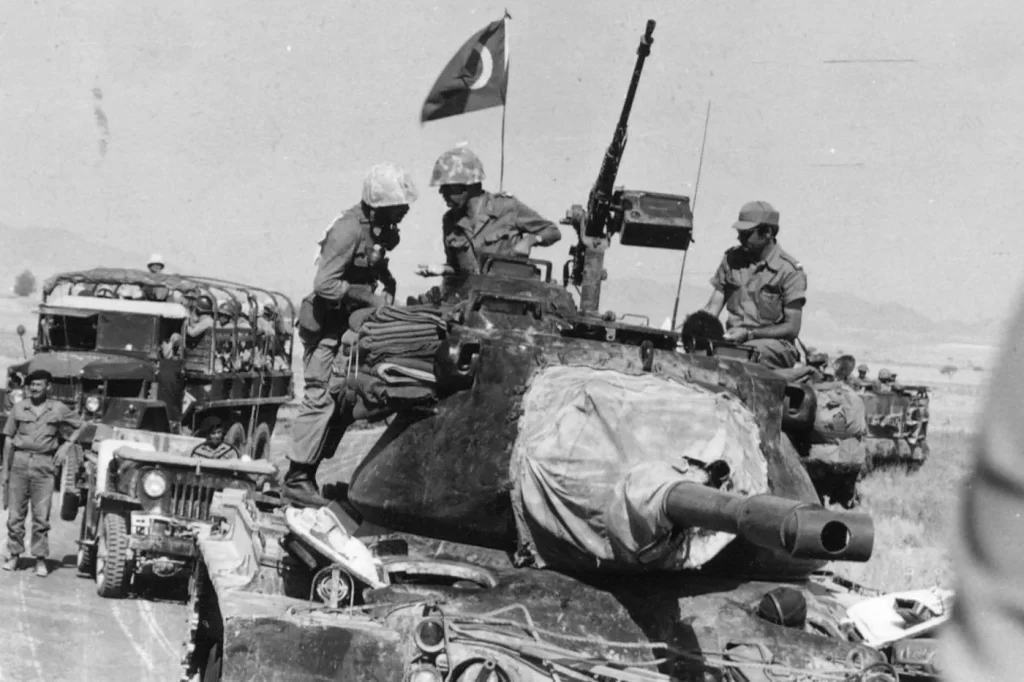
To this day, Turkey has steadfastly argued that its actions were legal and in accordance with Cypriot constitution. That, had it not done so, the Greek-Cypriots would have annihilated the island’s Turkish-Cypriot population.
For almost a month during the early phases of Turkey’s ‘peace operation,’ there was a flurry of negotiations between Britain, Turkey, Greece and the Republic of Cyprus. Whilst these were underway in Geneva, Turkish Prime Minister Ecevit ordered his troops to take a ‘fair share’ of the island. This directive was followed by a full-scale invasion which included extensive bombing of civilian areas, killings and mass rapes. Within days, Turkey had turned what at first may have seemed like a lawful intervention to ‘restore the status quo’ into an opportunistic and brutal invasion, occupying 37% of Cyprus.
Almost immediately after its invasion, Turkey embarked on a recolonisation of the island’s occupied areas with settlers from the Turkish hinterland in contravention of article 49 of the Geneva Convention, which states it is a war crime to remove a population and replace it with another and is tantamount to ethnic cleansing.
By 1984, Turkey had transferred 40,000 settlers to the island in a blatant and deliberate attempt to alter the demographics on the ground. Since 1974, approximately 150,000 settlers have been transferred to Cyprus from Turkey.
There is no doubt that in the past, certain Greek-Cypriot elements had more sinister ambitions but it was never the prevailing attitude, or objective, on the island in 1974. It is an absurd premise which has served Turkish domestic propaganda extremely well while feeding an endless animosity between communities.
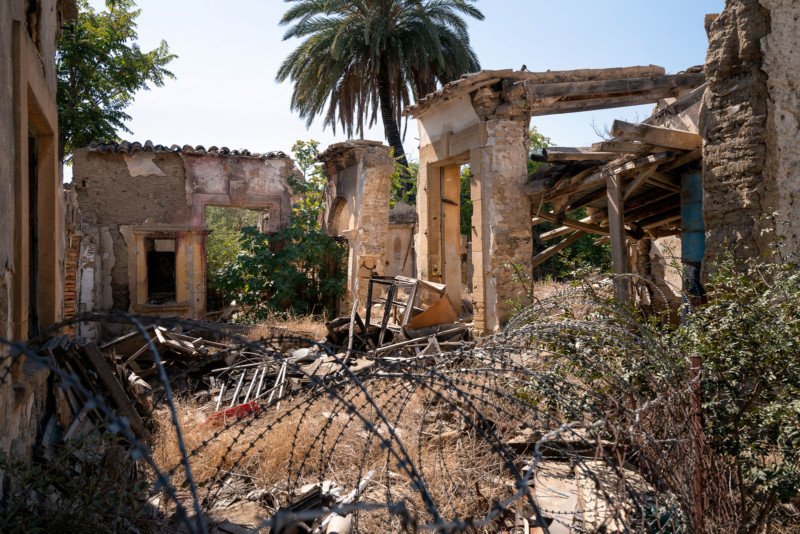
Turkish Cypriots are under no existential threat from their Greek-Cypriot compatriots. Greek Cypriots, on the other hand, have a legitimate fear of the 30,000 Turkish troops still stationed illegally on the island and a very powerful Turkey of 85 million people with its cutting-edge military capabilities, only 65 kilometres from the coast of Cyprus.
With a confirmed history of repeated genocides, Armenian, Greek, Kurdish, Turkey’s claims of victimhood cannot be taken seriously. It’s a mythology that the Erdogans and the Putins peddle to their nationalist acolytes.
There is no malicious agenda to erase the Turkish-Cypriot community or their history on the island. On the contrary, one need only look at the substantial difference in the mindset of the occupied north and free south. Unlike occupied Cyprus, free Cyprus celebrates its Ottoman/Turkish past. The official languages of the Republic of Cyprus are Turkish and Greek, and no matter which city you visit in the south you will encounter dozens of Ottoman street names, signs and landmarks.
There is no equivalent in the occupied parts of Cyprus. There is no Greek writing or streets named after famous Greeks, or Orthodox/Byzantine Churches and cemeteries that have not been desecrated in the vilest way. This says something.
The solution to the Cyprus problem rests squarely on the shoulders of Turkey. Turkey alone can solve this forgotten crime against humanity by demonstrating it is in favour of peace by simply withdrawing its troops and desisting from meddling in the affairs of Turkish-Cypriots. Hundreds of thousands of people still yearn to return to their ancestral lands and homes. It is time the international community, which today is justifiably protesting the illegal invasion of Ukraine, is reminded of another illegal invasion that has never been genuinely addressed.
*Dr Dimitri Gonis is a Melbourne-based writer.

